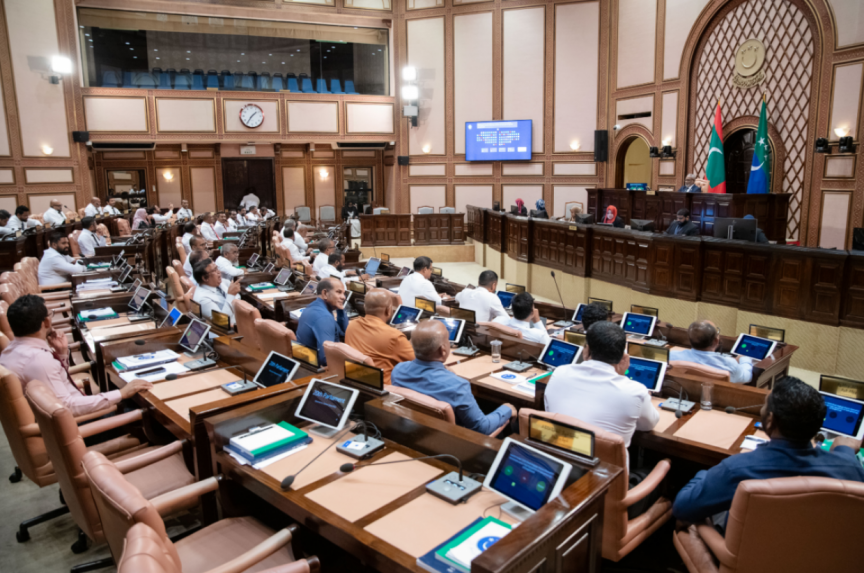
From the parliamentary sitting on Monday, August 4, 2025. (Photo/People's Majlis)
In a departure from the typical parliamentary procedure for inviting public feedback on legislative proposals, the amendment bill to the Decentralization Act has been allocated a mere 19 hours for public commentary.
The government has proposed five amendments to the Decentralization Act. These legislative modifications include provisions that could potentially curtail the authority of councils to recruit employees, lease lagoons and land within their jurisdiction, and implement development projects.
Significant public concern has been expressed regarding this bill.
"ޤާނޫނު ނަންބަރު 7/2010 (ދިވެހިރާއްޖޭގެ އިދާރީ ދާއިރާތައް ލާމަރުކަޒީ އުޞޫލުން ހިންގުމުގެ ޤާނޫނު) އަށް އިޞްލާޙު ގެނައުމުގެ ބިލު" އަށް ޢާންމުންގެ ޚިޔާލު ހޯދުމަށް ހުޅުވާލުން
— People's Majlis (@mvpeoplesmajlis) August 4, 2025
ބިލު : https://t.co/HX7BNqC8Us pic.twitter.com/OHAmg79XqQ
Concurrently, Parliament initiated the public comment period for the bill at 1800 hours on Monday. However, this period was limited to only 19 hours, falling short of even a full 24-hour duration.
The parliamentary office stipulated that written comments on the bill must be submitted to Parliament by 1300 hours on Tuesday.
Historically, bills have been open for public comment for periods exceeding one week.
In a social media statement, Moosa Shafeeg, President of the Haa Alifu Atoll Council, urged all members of parliament to engage with their constituents and respective councils to solicit public opinion.
The Maldives Democratic Party (MDP) has consistently opposed the government's amendments to the Decentralization Act. The party characterizes the government's actions as an attempt to undermine the decentralization framework that the MDP established during its tenure in power.
Certain councils, in particular, are opposing the proposed amendments.
Fayyaz Ismail, Chairman of the MDP, stated that with the proposed amendments, councils would lose their financial independence, leading to the collapse of the decentralization system and forcing councils to become subservient to the central government.
Abdullah Shahid, President of the MDP, asserted that the current government's proposed amendment to the Decentralization Act is intended to re-centralize the financial and natural resources of councils, effectively subjugating the populace.

What is in the amendment?
The bill outlines five main amendments:
Local Authority Company Operations: These companies would be prohibited from engaging in economic activities already undertaken by private enterprises in their operating islands. Their work must be essential for rural infrastructure development, and projects would require an investment exceeding MVR 10,000,000. Conflicting businesses would be discontinued within 90 days of the amendment's enactment.
Rent from Public Service Allocations: Councils would be barred from charging rent for land or buildings allocated to parties providing basic services to the public.
Revenue Allocation: Councils would receive revenue after deducting any state taxes, and if they have not paid for public services for over six months.
Bank Account Maintenance: Councils would be required to maintain bank accounts according to Ministry of Finance procedures and provide statements upon request.
Restrictions in Final Year: If a council's term is 365 days or less from expiration, certain actions would be restricted without adherence to norms set by the Ministry of Finance and the Local Government Authority (LGA). These include:
Recruitment of contractual or long-term employees for council offices.
Lease and grant of land, lagoons, and reef areas under council jurisdiction.
Initiation of new development projects not specified in council development plans.
Notably, the Ministry of Local Government, established by the current administration as the parent body for councils, appears to have no direct powers within these proposed amendments.
The government's amendments follows similar discussions in the past, and the 20th Parliament, which held a supermajority for the current government, previously amended the Decentralization Act multiple times.